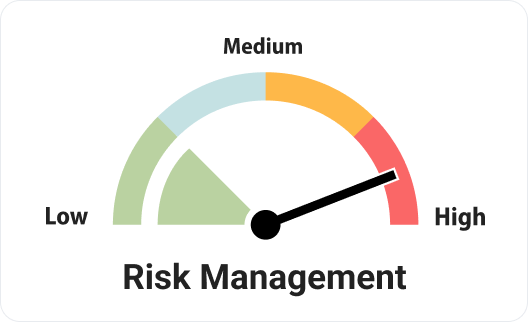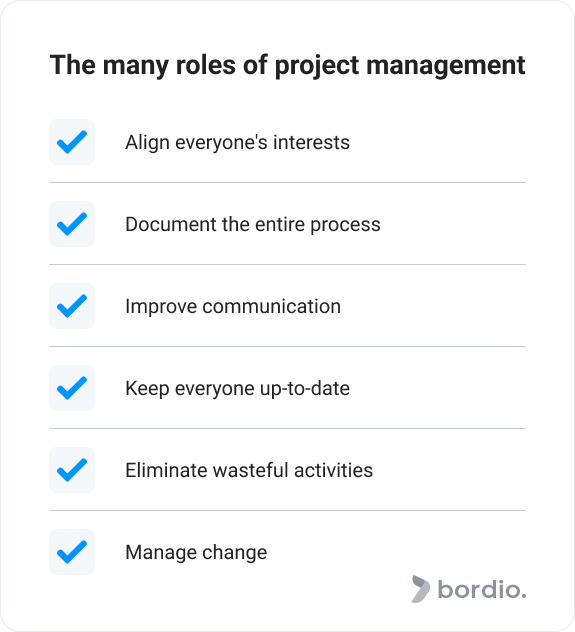Project management is a business practice used to oversee initiatives and manage people via proven techniques to meet the project requirements and deliver business value to the end-user.
There are many definitions of project management, but ultimately it is about getting the maximum return with minimal resources.
Nowadays, project management is considered one of the most important activities, and companies are on a constant hunt for talented project managers, as well as new techniques and tricks to guarantee project success.
But is it really that necessary for organizations today to pay so much attention to project management trends and overall? Let’s find out together how project management helps businesses in 2025 thrive and allows them to make the most of their resources and circumstances.
Why do we need project management in 2025
The future of project management looks bright.
The business environment is only becoming more competitive, so companies are ready to do almost anything to guarantee a successful outcome. As a result, project management is implemented for all kinds of activities within the organization, from such tasks as an increasingly complex technology integration to minor changes in products or processes.
Smart project management saves time and money, facilitates effective communication, and enhanced collaboration. To make your project work flow easily use team tracker software. Organizations get better risk management and are able to replicate their success in the future.
Now, let’s look at some of the reasons why 2025 is the year of project management.
#1 The rise of remote work
More people work remotely now than ever before. And the trend for the upcoming year is that we will see even more employees opting out for remote working.
Remote work brings a lot of benefits for the project, such as better resource management (reduced costs and access to talent from all over the world), but along with it, we have downsides. It will be much easier to work in a team with convenient tools for managing remote employees.
Multiple time zones, cultural differences, and specifics of online communication can turn into serious obstacles. Poor communication, conflicts, not understanding the end goal, and completing the work incorrectly, – all that often happens when project teams don’t have enough face-to-face communication or a solid communication plan. If you add other problems that often occur throughout the project’s lifetime, we end up in a pretty risky situation.
Remote work has become a blessing for thousands of employees. But making the most of the situation and avoiding the problems requires talented leadership, modern project management tools, such as a online weekly planner, and a clear structure in place.
#2 Risk management: reducing the risk of failure
Many projects fail because they are not managed properly.
These days it’s easier than ever to launch a project. Just have an idea, bring a few people together, agree on the end goal, draw some sort of plan in the accurate schedule planner, and that’s it!
Unfortunately, a lot of projects end up failing and never seeing the light of day. And poor management is among the top reasons for failure.
In 2025, as the world is still battling the global pandemic and the supply chains are damaged across the world, it’s harder than ever on business. In such a volatile situation, only project management professionals ensure that the project has the right framework with a detailed plan, all risks are calculated, everyone is on the same page, and there is a route to take should circumstances or priorities change.
It is worth mentioning that having a project manager or the product owner if you are utilizing Agile methodology, elevates the experience of the project team. Yes, the framework already makes it much easier to roll out and execute a successful project. However, no matter how self-disciplined everyone is on the team, someone has to manage the to-do list online, orchestrate the entire process and ensure the right direction, quality control, and effective collaboration. On top of that, someone has to stay in touch with project stakeholders to keep them happy and prevent them from meddling too much in the project process.
A project manager plays a vital role by taking accountability, monitoring the overall performance, improving team’s productivity, tracking and reporting progress, and mitigating all upcoming risks.
Without project management, threats and risks are often swept under the rug and prayed over not to happen. It is understandable – no one is particularly responsible for the project. And if you bring an issue up, then it is your duty to fix it. Hardly anyone wants to take action in that scenario. And if there is a dedicated project manager, then they are actively seeking out the risks to deal with as early as possible.
#3 Making sure project results align with business goals
Let’s say you used no project management, but your team was able to deliver a product at the end of the project.
You might consider this project delivery a success but if the client and other stakeholders disagree, then it was all for nothing. One of the key goals of project management as a system and the project manager as a leader is to ensure that the project is executed with the business goals, values, and strategies in mind.
The projects that the company executes define the entire business. And if the results are dissatisfactory, then the business is at risk.
Project management helps set the project for success from the beginning by:
- Aligning everyone’s interests, wants, and needs.
- Documenting everything to prevent unclarity and confusion.
- Improving communication to avoid misunderstandings.
- Ensuring all members of the process know what is expected of them and when.
- Spotting and cutting off busy work that does not generate value right at the schedule planning stage.
- Creating a process for change: if and when a change request comes through, there is a clear guideline on how it should be dealt with.
#4 Setting realistic plans and expectations
Project management systems work with project scope, budget, and timeframe. They set challenging yet manageable goals. With smart project management in place, the team can count on having adequate deadlines and milestones that will not be changed and challenged by stakeholders as the project goes on. Without project management frameworks, projects are often delivered late, go over the budget or both!
It takes experience, the right skill set, and knowledge to do the correct estimations and draw a project roadmap and the critical path, and maintain them down the line. You may use one of the best online planners by Bordio to do planning.
#5 Quality management
In the previous examples, we talked about the project teams either failing the project or delivering the wrong product at the end without a project management system. But what if the project is delivered within time frames and deadlines, and the value looks good on the paper?
There still might be hidden complications resulting in dissatisfaction.
Project management ensures that the value provided and the product delivered are of the quality that business requires. Consistency is key in projects and it is necessary to have a defined process for quality control at every milestone with every deliverable. Project management ensures there is a testing phase when it’s needed, that all bugs are fixed, and the right people are doing it.
#6 Having a project management expert leading the process reduces costs, complexity, and errors
There are a lot of nuances that go into managing projects. Implementing a project management framework, instilling a digital calendar planner or simple time planner for transparency, and having a PM in charge helps avoid the common mistakes and drawbacks that happen to so many projects.
A project manager is up to date with the latest project management trends that an in-house team is not likely to be aware of. They are also aware of the best project management software and task organizing app that can speed up the project progress and, for example, take care of manual repetitive tasks.
The work team does, the platforms they use, the issues they’re likely to face – project managers take care of all of that. So, while yes, hiring a PM is a costly exercise, they are well worth it in the end.
Yet, probably the most important job of the project managers is being a project cheerleader who uses the best electronic tools. They bring everyone together, keep motivation levels high, and make sure everyone gets to the destination happy and sound.
#7 Making use of the previous experiences
Project management is a science on its own.
A lot of the standards, frameworks, and techniques were designed directly by those who were working on countless projects and kept facing the same impediments. The project management that we know today is basically a set of best practices that were tried and tested thousands of times before they became the standard.
Without project management companies tend to bump into the same roadblocks and repeat the same mistakes over and over again. Nowadays, with all of the life’s uncertainty, there is really no need to make mistakes that could have easily been avoided with a daily planner app and diligent management.
Final thoughts on why project management is important
Executing a project without proper project management in place is like gambling. Yes, you might win. But there is a possibility that you will lose.
Without project management, there’s usually chaos, lack of clarity, unrealistic plans and goals, poor quality results, additional expenses, and missed deadlines.
With project management tools and frameworks, the process is well calculated and estimated, the team can relax and focus on their work, stakeholders have a formal plan in their schedule builder with deadlines and all that. They have an understanding of what comes next, who is responsible for what, what the risk mitigation plan is, how the end-result quality is ensured and tracked.
Regardless of whether you are working with one of the waterfall methodologies, Agile, or some of the hybrid project management techniques, having a system in place always beats just going with the flow and hoping for the best.








